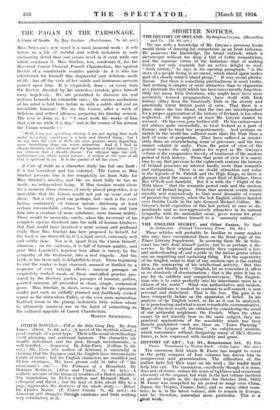SHORTER NOTICES.
THE HISTORY OF IRELAND. By Stephen Gwynn. (Macmillan and Co. 12s. 6d. net.)
No one with a knowledge of Mr. Gwynn's previous books would think of denying his competence as an Irish historian. He possesses the knowledge, the broad outlook, which is picturesque without too deep a tint of Celtic romanticism, and the supreme virtue of the historian—that of making history not only readable but an active delight to read. " Irish history," he says in his opening paragraph, " is the story of a people living in an island,,which island again makes part of a closely related island group." It may sound platitu- dinous. But there is something platitudinous in most truths. And nothing is simpler or more attractive than to stigmatize as a platitude the truth which has been conveniently forgotten. Only too many Irish historians, who might have been more accurately termed propagandists, have dealt with Irish history either from the fanatically Irish or the sternly and practically Great British point of view. That there is a place where the two blend, that the two are interdependent for a proper appreciation of the history of Ireland, is too often neglected. Of this neglect at least Mr. Gwynn cannot be accused. He has even gone further still. He has endeavoured not always quite successfully, to treat Ireland as a part of Europe, and to treat her proportionately. And perhaps no nation in the world has suffered more than the Irish from a lack of sense of proportion. They have suffered so consist- ently from an overwhelming sense of grievance, and the two cannot cohabit in unity. From the point of view of the general reader the only matter for regret in Mr. Gwyrm's volume is the comparative brevity of treatment of the modern period of Irish history. From that point of view it is surely true to say that previous to the eighteenth century the history of Ireland possesses an interest hardly more than romantic and antiquarian. There is no doubt attraction and value in the legends of St. Patrick and the High Kings, as there is glamour about the names of the great Earl of Kildare, Owen Roe O'Neill and Sarsfleld. But it is with the " Flight of the Wild Geese " that the romantic period ends and the modem history of Ireland begins. From that moment events march steadily and remorselessly to that most dramatic of events of present-day history, when the last English soldiers banded over Dublin Castle to the late General Michael Collins. Mr. Gwynn's lucid exposition of this last period, at once so dis- passionate and so non-aggressively attractive in its natural sympathy with the nationalist cause, gives reason for great regret that he confines himself to a summary outline. '














































 Previous page
Previous page